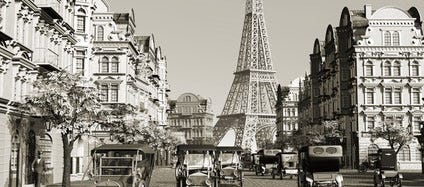The Best Part of Writing
I have a name. Or I should say, to be clear, my narrator has a name.
I’ve been kicking around an idea for a novel for a while now. I may have mentioned it on here; I definitely mentioned it to a few people reading this. It’s set in Paris in the 1920s, and concerns a Japanese painter. For a while I thought the painter would be the main character but then I realised that I didn’t want to explore him from the inside out, but from the outside in (so to speak). I needed a narrator who was separate from my main character. A Sancho Panza figure, a guide for the reader, a filter, a lens. So I stalled. I knew what I didn’t want my narrator to be, but I couldn’t figure out who he was. Since he would be telling the story, I couldn’t begin without him.
Yesterday, an epiphany, and I met him. Details are scarce, but he has an outline, a silhouette. He has a date of birth (a very important first step. My novel will be set between 1924 and 1928, so I need him to be both old enough and young enough in those years for the story to make sense), a place of birth, and a name.
The name is the most important thing for me. Nameless characters are absences, voids, a nothingness of potential. A name crystalises something. It has to be perfect. It has to fit. I know when it does because the second I name a character, they appear before me, whole, ready to begin telling me their story. So I go though a process.
He’s Scottish. He’s a he. He’s born in 1906.
So that narrows it down. He’s not going to be called Ryo and he’s not going to be called Chardonnay.
He’s from Aberdeen. What are some quintessentially Aberdonian names? Well, in my imagination typically Aberdonian male names can be found on the team sheets of the classic 1980s era Aberdeen FC. McLeish. Miller. Cooper. Simpson. Hewitt. Close but not quite right. McKimmie. No, not an M. I’m Maloney, I tend to shy away from M surnames. So what. L. Leighton. Jim Leighton, keeper for Aberdeen and Scotland.
Something shifted, a change in focus. Leighton. That’s the one. That’s the surname.
An L immediately suggested a D. Don’t know why, just did. D. Leighton. Daniel.
I wrote it on the whiteboard in my office. Daniel Leighton.
I didn’t like that the two Ls go together. danieL Leighton. Daniel Ate On. Danny Late On.
I could play with that in the narrative, nicknames are good, but no, I still couldn’t see his face. Not Daniel.
Douglas? Douglas Leighton. No, that’s the father. I can see him. First World War. Somme. Passchendaele. One of those. Didn’t come back. A photo on the mantle. Boots under the stairs. Shoes to fill.
David.
There he is. I see him now. David Leighton. David Douglas Leighton. Davy. 18 years old. Yet to fill out. Brother and sisters? Not sure yet. I tend to write younger brothers, something about the dynamic, the relationship, the blend of strength and weakness younger brothers tend to have. Maybe I’ve done that enough. To one side. The rest of the family will follow in time. I have father and son, and that’s a good start.
David Douglas Leighton. 18 years old. Off to Paris: the roaring twenties, the cafes, the artists, the writers, the Olympics. A meeting with a tragic painter. A meeting with his tragic wife. A story.
A story, waiting there for me, ready to unfold with David Douglas Leighton’s first footsteps through the streets of Paris. This is the fun part, the best bit. It’s all there, I can see it, a long and winding road stretching ahead. Tantalising. Exciting. Invigorating.
The last breath before the plunge.



Thanks for sharing your thought process. Enjoyed that insight.